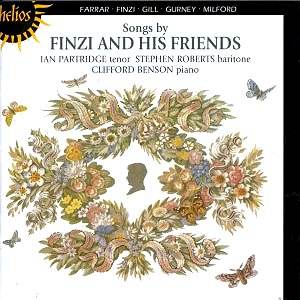As its playing time suggests this is a direct crib
from a sequence first issued on LP. By 1981, when these sessions took
place, the Finzi revival was well under weigh. The Clarinet Concerto
was being played everywhere and after a sleepy start the Lyrita LPs
were beginning to sell healthily.
The voice of Ian Partridge and the songs of Gerald
Finzi were made for each other. In some ways he was the successor
to Eric Greene (who had premiered Intimations) and Wilfred
Brown. His astonishing breath control, distinctive white vibrato-less
tone, feeling for the English language and communicative intelligence
made him a natural Castor to Finzi's Pollux. Thank God we have
him in the Lyrita LP of Intimations of Immortality (his
singing of the Wordsworth words 'The moon doth with delight ...'
is one of the pinnacles of musical art). I continue to search
for the grail of a recording (any recording!) of Partridge in
Dies Natalis.
The equivalent Hyperion LP was launched at the 1981
Finzi Weekend organised by Kerry Tombs. I remember Partridge signing
copies. They sold like hot cakes from stacks unloaded by Ted Perry from
the back of his car. My autographed copy is somewhere in a box under
the stairs.
Ian Partridge broadcast extensively on the BBC. His
voice together with that of Robert Tear (very nasal by comparison) and
the sadly under-rated Gerald English along with that of baritone John
Carol Case (whose later decay into vibrato was all the more distressing
because of his earlier excellence) was the hallmark of the resurgent
interest in British song. I do not forget that he also kept a foot in
the early music camps as well - notably when singing with Pro Cantione
Antiqua.
The two Finzi sets featured here were artfully assembled
and ordered by Howard Ferguson whose faithful pianism distinguished
the two Lyrita Finzi song set/cycle LPs on 1969-71.
Stephen Roberts is imposing with a voice grainy and
darkly inclined. It is well suited to the Flecker setting To a Poet
a Thousand Years Hence. He colours it in amber and jet for the de
la Mare song The Birthright. June on Castle Hill is masterly
Finzi with its drama ('white flags far unfurled') and its comforting
('Earth sleeps in peace') seeming either an echo of or a sketch for
Channel Firing. Similarly powerful, alternating grim and troubadour
style, is the Ode on Rejection of St Cecilia.
Roberts' superbly catches that mesmerising world between
sleep and waking for Gurney's Sleep and the delicious regret
of Down by the Salley Gardens. Gurney threw caution to the winds
for the triumphant optimism and carousing swing of Hawk and Buckle.
The words are by John Doyle - a pseudonym for Robert Graves the author
of the Claudius and Count Belisarius novels as well as a vivid memoir
of World War I in 'Goodbye To All That'.
Partridge takes the three Milfords. If it's ever
spring again (Hardy) is a quickish love song pent with an uncertainty
that spring and summer may never return … or that the singer will never
see them. Deliciously simple is The Colours - another Hardy with
a downbeat sting in its tail. This is Milford centenary year (2003)
so we must hope for more recordings especially of the Violin Concerto,
Prophet in the Land and The Darkling Thrush for violin
and small orchestra. Ernest Farrar was killed in the Great War. His
rumba style O mistress mine goes with a fine swing. The Harry
Gill song sits well in this company with its understated sorrow at the
loss of comrades. Where are the aching loss-filled songs of German composers.
Surely they were written. Why do we not hear about them?
Oh Fair to See is a truly wonderful cycle. It
has been part of my life since the 1970s BBC broadcast back in
1972 or 1973. It is masterly in its grouping and assembly (the work
of Howard Ferguson) as well as in its individual word setting. Perfection
is not too strong a word. We start with I say I'll seek her side
- part scena; part lovelorn - well it is Hardy! Oh fair to see
has about it no tragic ambivalence. This is evidently the same Cherry
Tree viewed by Housman but decked in contentment not laced with knowledge
of fallen blossom and winter. Time after time Finzi slips his emotional
scalpel tenderly through our callous defences. Whether it is in Edmund
Blunden's heart-achingly searching To Joy (the death of his baby),
the brief Gurney setting of Severn Meadows (the hush just before
'Do not forget me quite' not quite as magically caught as in Partridge's
1970s BBC broadcast) or the rapturous Harvest (an ambitious and
unflinching biographical traversal) icy tragedy (the same scorched cruel
skies as in To a Poet!) meets pastoral ecstasy. Ferguson chose well
when he made Robert Bridges' Since We Loved the last song - a
song to Finzi’s wife, Joy. Its contented reflection echoes that of the
Edward Shanks song As I lay in the early sun. Finzi's works have
indeed 'prosper'd well'!
If you do not already have this and you are a proponent
of British song then lose no time in snapping it up. Already discovered
the main Hardy cycles? An enthusiast of the songs of Michael Head, Warlock,
C.W. Orr and Vaughan Williams? This collection, complete with its
well set back analogue hiss, is an essential addition to your collection.
Rob Barnett
